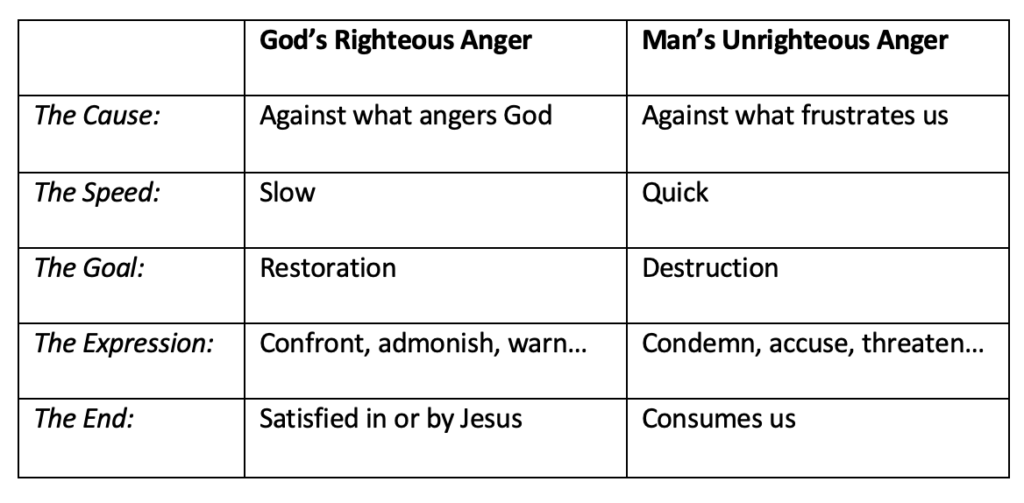The Apostle James wrote that “human anger does not accomplish God’s righteousness” (James 1:20). There is a difference between God’s anger and human anger, righteous and unrighteous anger. Not all anger is bad. God is holy and loving and His anger is holy and loving and always good. So, there is a good anger. It is human anger that ruins us. Renowned Christian counselor David Powlison wrote:
Your anger is both brilliant and appalling. The shifting line between good and evil plays out when it comes to your anger. Your anger is Godlike to the degree you treasure justice and are alert to falsehood. Your anger is devil-like to the degree you play God and are petty, merciless, whiny, argumentative, willful, and unfair.
Anger can be good or bad, and it is the bad anger that diminishes our joy, damages our physical and mental health, and destroys relationships. How can you spot the difference? I put this chart together in a recent message to attempt to help people discern between the two:

Sadly, I have learned that my anger can begin with a righteous cause and then shift to an unrighteous response. We want the cause of our anger and the response to be godly.
The cause: Augustine wrote: “In our ethics, we do not so much inquire whether a holy soul is angry, as why he is angry.” The why we get angry is the first step in identifying if it is holy or unholy. John 11 records Jesus at the graveside of His friend, Lazarus. Three times in the passage, Jesus is described as being “deeply moved.” It is the same word used for anger in other places in the Scripture. Jesus was angered at the death, angered that people He loved were facing the cruelty of this world, and angered about the impact of sin in our world. This was a holy anger. We are right to be angered at sin and the impacts of sin. We should hold a holy displeasure about God’s name being defamed, about people created in His image being abused or oppressed, and about our own sinfulness.
The speed: Righteous anger is slooooow and unrighteous anger is quick. We often say, “He has a short fuse,” or “She has a quick temper.” The phrase gives the picture that the person is going to blow up because the fuse is short, and that the moment from when the person has been lit to the explosion is really quick. The Scripture uses the opposite language to describe patience: long-tempered. Long-fused. Thankfully God is patient and slow to anger with us.
The goal: The goal of righteous anger is to restore to God’s design and intention. When Jesus was angered in the temple and overturned tables, He was filled with holy displeasure because Gentiles were not going to be able to offer sacrifices to God. The goal of human anger is to destroy someone or something with the hope that someone will suffer or be humiliated.
The expression: In his book, Good and Angry, David Powlison pointed out the different expressions between righteous and unrighteous anger. “Godly anger confronts someone. Human anger condemns. Righteous anger admonishes, while unrighteous anger accuses. Righteous anger warns, and unrighteous anger threatens.”
The end: The end of God’s anger is satisfied in Jesus or by Jesus. For those of us who believe in Jesus, there is no anger from God left for us because it was all poured out on Jesus. For those who do not, Jesus will pour out wrath at the end of times. If we do not trust God with vengeance, we will be consumed with our desire for others to pay and we will be ruined.
May we be righteously angry at our own unrighteous anger.






